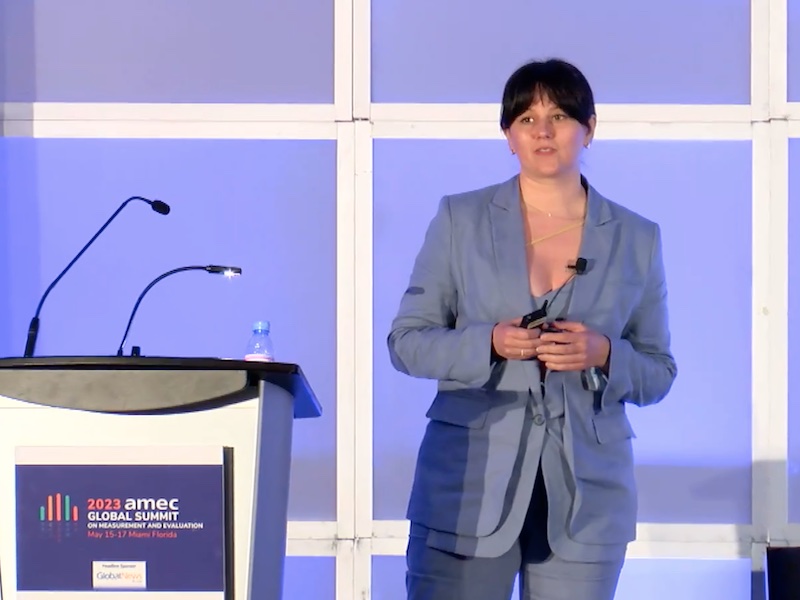Maja Pawinska Sims 24 May 2023 // 3:54PM GMT

MIAMI — The value of communications to Ukraine as its invasion by Russia continues into its second year is on a different level to most evaluation metrics, PR Army co-founder Julia Petryk told delegates at the AMEC global measurement summit in Miami last week.
In an emotional and perspective-giving closing session to the two-day summit – ending in a standing ovation from a packed room of delegates – Petryk outlined her experiences of the invasion from its early days, how communications was used to respond to the crisis, and what the reaction from the local and global PR community and media had meant to the country.
“You might think of a communications crisis as a product recall, or negative comments on social media, or a stock price fall. But for us, the worst crisis is war,” she said.
Petryk co-founded the PR Army volunteer group with other Ukrainian PR professionals right at the start of the invasion to provide accurate information and eyewitness accounts to global media outlets, as well as continuing her role as head of PR at Kyiv-headquartered software development company MacPaw.
Even before the invasion started, Petryk and her in-house communications team at MacPaw had analysed possible risks: physical danger to team members, no internet connection, the office occupied by invaders, increased cyberattacks on company services, increased phishing attacks on employees and supply chain disruptors.
“Before the invasion, we established an alternative secure comms channel via Signal in case Slack couldn’t cope. We prepared emergency backpacks for employees and conducted training in first aid, understanding of how disinformation works, and psychological resilience under pressure. We went into ‘code freeze’ mode for all products, with no changes made to products, no updates and no new releases.”
As the first wave of the attack started, Petryk said her priorities were to communicate with the team about their safety, assure customers that MacPaw’s products were stable and make a company statement.
“We gathered an emergency response team, moved all infrastructure to the cloud even though our main servers were outside the country, set up a satellite internet connection and gathered the core comms team. We were bombarded with media requests and needed to respond so we had the attention of the global community, so I prepared a statement by the company in case of full-scale war. The statement was written on behalf of our CEO, because leadership mattered, and said the team members are safe, users’ data is safe and MacPaw is operational, as well as ways to help Ukraine, using #StandWithUkraine.
“I thought the draft statement was too emotional, but when the morning of the invasion came I was the most emotional person. We were facing danger, fear and death. It’s not a scenario you are prepared for.”
There was also no way of preparing for the reality of working in shelters, underground and even in the bathtub: “In the daytime, I worked in the bath, as it was considered the safest place to be, and I slept in the car in the car park at night. A lot of media reached out for comment and pictures; we had no time for that, but my daughter had taken a picture of me working in the bath and that became a headline maker. It also turned into the PR Army’s Bathtub Creative campaign to raise awareness and funds. But it wasn’t a joke – it was our reality.”
Petryk said there were many communications lessons from her experiences of the past 15 months, firstly: “You can prepare a plan but you can never be ready. Communicate clearly, don’t be silent. Fight for truth wherever possible.”
Another takeaway was the importance of media and stakeholder relations in a crisis: “Be available for the media despite everything. Our CEO was talking to journalists throughout the night and during air raids. In the first month of the invasion, MacPaw’s media reach from earned headlines was seven times more than usual, thanks to relationships we built with the media. War demonstrated how important it is to build relations – finally, all businesses understood the value of public relations.”
Petryk said her final lesson was how successful communications could be when professionals united their efforts, as in the creation of the PR Army to demonstrate Ukrainian resilience: “Within the first hours of full scale invasion, with all the horrors and the need to make decisions and communicate, we created the PR Army to make sure Ukrainians voices are present and heard in the international media.
“We started on 24 February 2022, and we’re now an organisation with processes and workstreams including disinformation resistance and Ukrainian resilience, and we have started working on the topic of illegal deportation from Ukraine territories with the Where Are Our People? campaign. I’m very proud of everything we have done.”
The efforts of the PR Army have so far yielded more than 1,600 pieces of coverage across 40 countries, and – more important than media metrics – its work has led to human outcomes, such as the release of a Ukrainian activist from Russian captivity: “The value of communications is more than media results or sales. It’s about someone’s life and dignity,” said Petryk.
In terms of how the international PR and communications community can continue to support Ukraine, Petryk said: “Don’t forget about us. Don’t forget about the genocidal war in centre of Europe. And don’t say ‘war in Ukraine’, say ‘Russian invasion’. You can also help with resources and tools, but you don’t need to be useful: just be human, and not indifferent.”
Earlier this year, The PR Army launched a new platform, Voices of Freedom, to connect journalists and communications professionals with trusted sources within Ukraine, as part of its efforts to combat misinformation. The organisation’s ‘Fighting With Our Words’ campaign with Plus Communications took home the Platinum SABRE at this year’s North American SABRE awards earlier this month.



































.jpg)

















